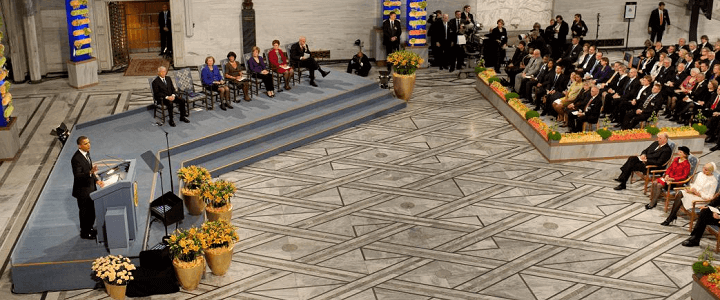Let’s just get one thing out of the way up front: despite conservative chatter, no one deserves the Nobel Peace Prize for developments in Korea just yet. While there have recently been promising developments, we are light years away from declaring victory. It bears repeating that North Korea has gone back on its word so many times it’s safest just to assume they’re lying until they prove they aren’t.
But if it all comes together, and by some miracle the North gives up its nukes in exchange for a permanent peace that preserves the Kim regime, he will have the strongest case for the prize of any American president in recent history. For that reason alone, Indiana Republican Rep. Luke Messer, who is in a heated three-way battle for the nomination to challenge Democratic Sen. Joe Donnelly this fall, has been beating the Peace Prize drum.
As a congressman, Messer is entitled to nominate someone for the prize, which last year went to the International Campaign to Abolish Nuclear Weapons. While in theory anyone could submit a nomination, the committee only considers those from certain people, like members of national assemblies, heads of state, cabinet secretaries or ministers, university professors and foreign policy think tank directors. The Nobel Committee says there are 330 nominees for the 2018 prize, which will be awarded in October. But nominations for this year’s prize closed on January 31. One way or the other, Trump has to wait.
Don’t hold your breath
But it’s best not to get your hopes up, even if everything in Korea goes perfectly. I can easily see the committee awarding the prize to Moon Jae-in and Kim Jong-un without acknowledging the plain fact that without Trump’s leadership, none of this would have been possible.
The committee is notoriously biased against conservative nominees, even when they’re genuinely responsible for peace. As I pointed out in October, the 1990 awardee was Soviet Premier Mikhail Gorbachev, supposedly because “he brought the Cold War to a peaceful end.” To the committee, Reagan and Bush had nothing to do with pushing for the nuclear arms reduction treaties that eased worldwide tensions.
On the positive side, George Marshall, the retired general turned secretary of state who devised the eponymous Marshall Plan that rebuilt Europe after the Second World War, won in 1953 despite being the man who gave the orders to drop the only two nuclear weapons ever used in combat. And in 1978, Egyptian President Anwar Sadat and Israeli Prime Minister Menachem Begin shared the prize for signing the peace treaty negotiated by President Jimmy Carter. That treaty, the first between Israel and an Arab country, still holds today, despite Sadat’s brutal assassination during a military review in 1981.
Your mileage may vary
The 1994 prize, though, provides an example of the perils of awarding it to someone before the proverbial dust has settled. For signing the Oslo Accords, the committee awarded the prize jointly to Israeli Prime Minister Yitzhak Rabin, his foreign minister, Shimon Peres, and Palestine Liberation Organization Chairman Yasser Arafat. That agreement ended what was called the First Intifada, a Palestinian uprising against Israeli authority. But Rabin was soon assassinated by an Israeli extremist, and the Second Intifada began in 2000, lasting until 2005, a year after Arafat’s death.
Most recently, President Barack Obama won the prize in his first year in office, essentially for not being George W. Bush. Much to the committee’s certain dismay, he went on never to meet a drone strike target he didn’t like and sent American airpower to aid the dubious overthrow of Libyan strongman Muammar Gaddafi. This, after Gaddafi, shaken by the U.S. invasion of Iraq, had voluntarily and verifiably given up his nuclear program.
Libya remains an essentially failed state to this day.




